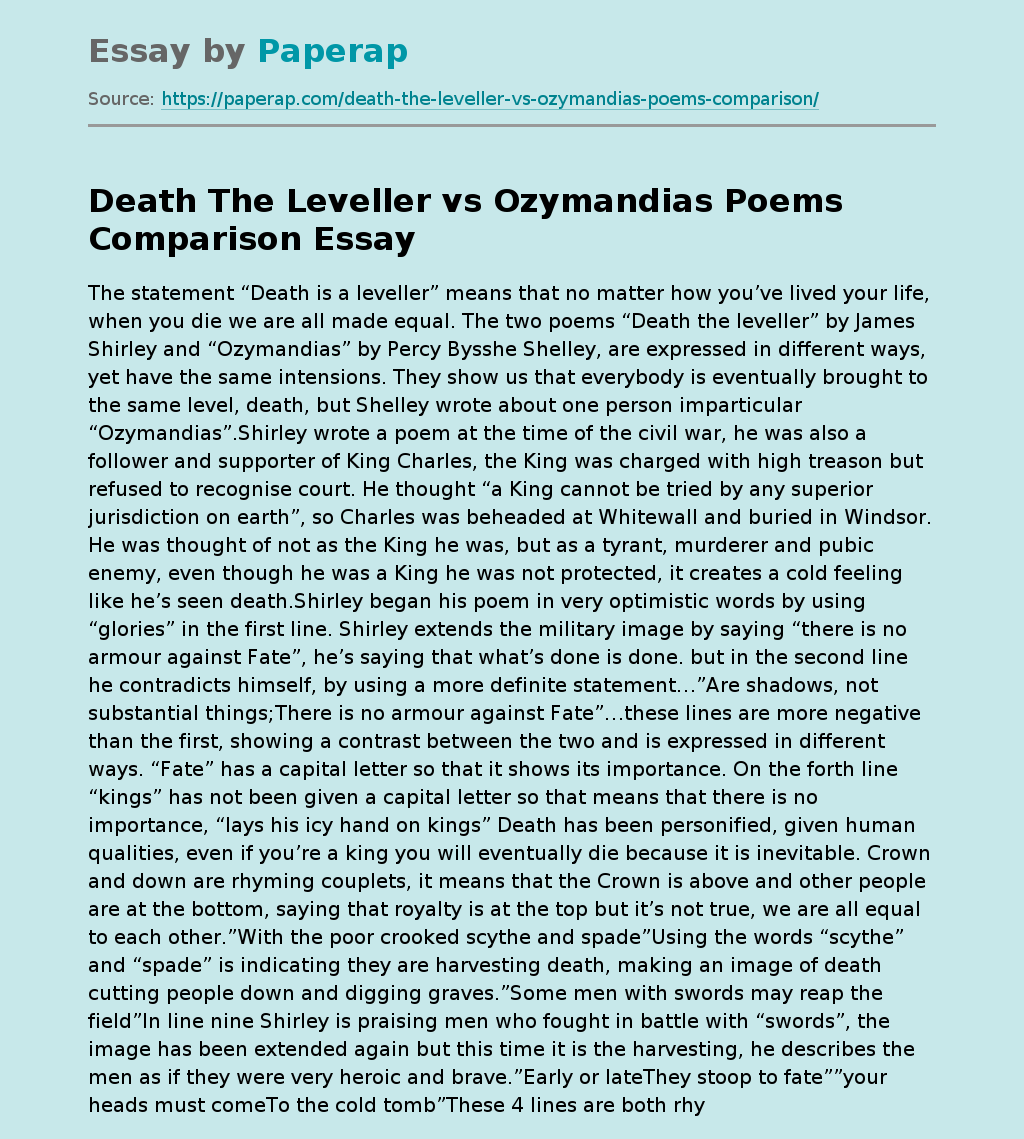Death The Leveller vs Ozymandias Poems Comparison
The statement “Death is a leveller” means that no matter how you’ve lived your life, when you die we are all made equal. The two poems “Death the leveller” by James Shirley and “Ozymandias” by Percy Bysshe Shelley, are expressed in different ways, yet have the same intensions. They show us that everybody is eventually brought to the same level, death, but Shelley wrote about one person imparticular “Ozymandias”.Shirley wrote a poem at the time of the civil war, he was also a follower and supporter of King Charles, the King was charged with high treason but refused to recognise court.
He thought “a King cannot be tried by any superior jurisdiction on earth”, so Charles was beheaded at Whitewall and buried in Windsor.
He was thought of not as the King he was, but as a tyrant, murderer and pubic enemy, even though he was a King he was not protected, it creates a cold feeling like he’s seen death.
Shirley began his poem in very optimistic words by using “glories” in the first line. Shirley extends the military image by saying “there is no armour against Fate”, he’s saying that what’s done is done. but in the second line he contradicts himself, by using a more definite statement…”Are shadows, not substantial things;There is no armour against Fate”…these lines are more negative than the first, showing a contrast between the two and is expressed in different ways. “Fate” has a capital letter so that it shows its importance.
On the forth line “kings” has not been given a capital letter so that means that there is no importance, “lays his icy hand on kings” Death has been personified, given human qualities, even if you’re a king you will eventually die because it is inevitable.
Crown and down are rhyming couplets, it means that the Crown is above and other people are at the bottom, saying that royalty is at the top but it’s not true, we are all equal to each other.”With the poor crooked scythe and spade”Using the words “scythe” and “spade” is indicating they are harvesting death, making an image of death cutting people down and digging graves.”Some men with swords may reap the field”In line nine Shirley is praising men who fought in battle with “swords”, the image has been extended again but this time it is the harvesting, he describes the men as if they were very heroic and brave.”Early or lateThey stoop to fate””your heads must comeTo the cold tomb”These 4 lines are both rhyming couplets, and they have both been fit onto smaller lines than the rest of the poem. The first quote means that if you are young or old then it is inevitable that you will die. The second quote is describing a big cold tomb like a mausoleum, and is a definite statement.
On the seventeenth line the poet is making it more person by saying “your brow” instead of someone else’s, then on the next line Shirley is personifying death again and given it importance by using a capital letter for the “D” in death. He also mentions a purple alter, an alter has religious purposes and therefore he is mentioning religion and royalty. “victor-victim” has been linked together using a hyphen.”Only the actions of the justSmell sweet and blossom in their dust”In these lines Shirley uses alliteration and is emphasizing what we become when we die and summing-up everything that he has mentioned in his poem “Death the Leveller”, but this has also been shown in another poem about an Egyptian Pharaoh named Ramases.
Death The Leveller vs Ozymandias Poems Comparison. (2019, Nov 27). Retrieved from https://paperap.com/death-the-leveller-vs-ozymandias-poems-comparison/

